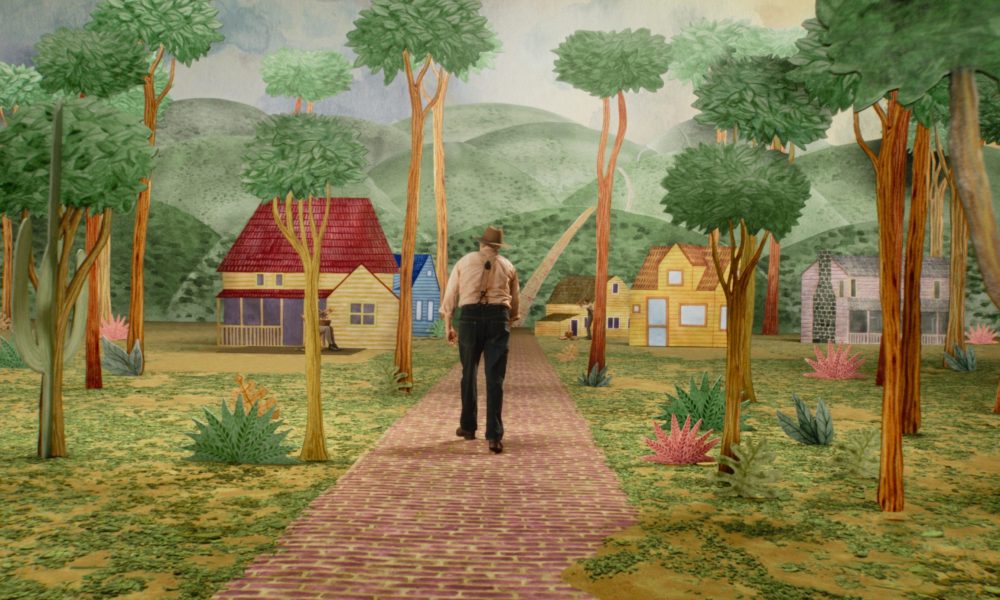
“Nightmare comedy” is the perfect phrase to describe Ari Aster’s Beau is Afraid, a darkly funny Kafkaesque odyssey that defies easy categorization. The writer and director of Hereditary and Midsommar is back with yet another emotionally complex saga, this one his most ambitious yet. The visionary combs his literary and cinematic influences, infusing them into a surreal, emotionally tumultuous journey that’ll prove divisive for its cryptic, unhurried storytelling.
Beau Wassermann (Joaquin Phoenix) lives with constant unrelenting anxiety smack in the middle of a chaotic city. His ramshackle apartment with thin walls and unkind neighbors seems peaceful compared to the violent chaos outside in the streets. Yet, the most significant source of Beau’s emotional turmoil stems from his strained relationship with his mother, Mona (Patti LuPone). A planned trip home instills panic, prompting Beau’s longtime therapist (Stephen McKinley Henderson) to prescribe medication and coping measures. The sudden, shocking news that Beau’s mother died sends him reeling, giving him enough courage to face his fears and embark on an existential voyage home.

Photo credit: A24
Aster showcases his warped sense of humor in catapulting Beau, a neurotic and ill-equipped protagonist, into a hero’s journey. The filmmaker creates no shortage of impressive sight gags and cringe moments to present how terrifying the world appears to Beau, who lives in constant fear and paranoia. Even the act of crossing the street to buy a bottle of water becomes a nearly insurmountable task as various denizens and obstacles descend upon Beau. Not even Beau’s sanctuary feels safe; hostile unseen neighbors and a pesky Brown Recluse problem highlight his constant instability. Aster wrings a macabre sense of humor through the impressive depth of field here.
The filmmaker fills the frame with background characters and violent acts that give viewers much to take in, instilling laughter and shock as it ensures its on-edge hero feels suffocated by the madness. Phoenix’s primal portrayal ensures Beau’s neurosis is matched by a sympathetic vulnerability that maintains rooting interest as Aster throws every imaginative, insane barrier in Beau’s path. And it gets increasingly wilder as it goes.
The more this peculiar reflection of our reality throws at Beau, the more he retreats inward, becoming passive to the world’s eccentricities as he finds himself instead unearthing repressed memories and past choices that led to his bizarre predicament in the present. Aster propels his lead through an audacious visual odyssey that employs various techniques and styles to mark the filmmaker’s most impressive effort yet. Animators Joaquín Cociña and Cristóbal León, behind the eerie animated horror feature The Wolf House, present a stunning second act sequence that sees Beau working through some of his absent father issues. It’s another example of how Aster manipulates form and technique to explore Beau’s fragile psyche. The almost soothing introspection of Beau’s daddy issues contrasts with the profoundly disconcerting terrors mined from his unhealthy relationship with an overbearing mother.

Photo credit: A24
It’s here where Aster wields his horror with a sharpness. Flashbacks of a young Beau with a younger yet no less controlling Mona (Zoe Lister-Jones) underscore the “nightmare” part of this “nightmare comedy.” As Mona tucks her son into bed, a monologue about inherited traits becomes ominous as only the kaleidoscopic colors of his bedside projector lamp light her face in the pitch-black room. Past and present bleed together in true nightmarish fashion, slowly building the nightmarish puzzle that is Beau’s relationship with his mother.
Beau is Afraid exemplifies Aster at his most daring and unrestrained. Beau’s journey home brings no shortage of physical comedy and suffering, but it’s more interested in the internal voyage and traversing the murky depths of Beau’s id. A three-hour runtime reliant upon a methodical, sometimes meandering, unpacking of Oedipal themes through symbolism and visual form over conventional storytelling makes Aster’s latest the most ambitious yet least commercially appealing. The cryptic unpacking of a life bogged down by guilt and repression comes with no lack of jarring visuals and moments bolstered by riveting performances and a seamless blending of style, form, and genres.
Aster drops viewers directly into Beau’s head, resulting in a wildly ambitious odyssey through one warped mind as it navigates Beau’s memories, dreams, nightmares, and fears far removed from reality. It doesn’t just play with one genre, but all of them, and often at once. That Beau is Afraid remains steadfastly untethered to realism makes for Aster’s most divisive effort yet, but those willing to ride the wave of genre and mind-bending insanity will find themselves rewarded by a profoundly imaginative and audacious artistic experience unafraid to explore unwieldy themes through a Kafkaesque odyssey as dementedly funny as it is often horrifying.
Beau is Afraid releases in limited theaters on April 14 before going wide on April 21, 2023.














